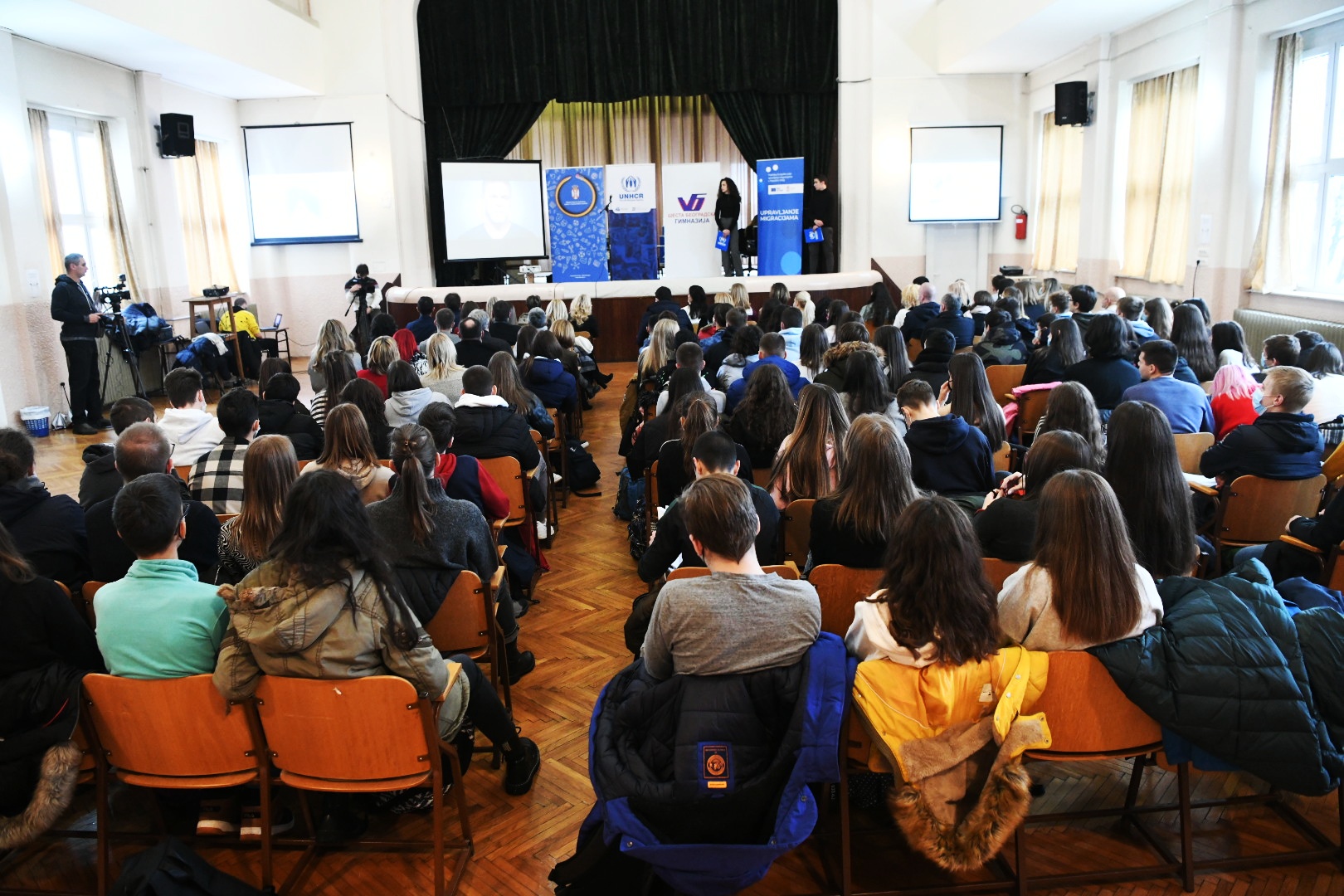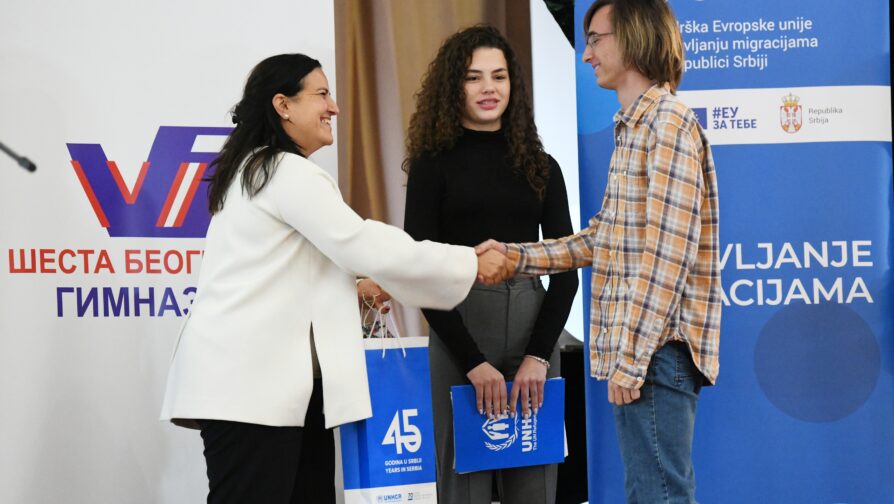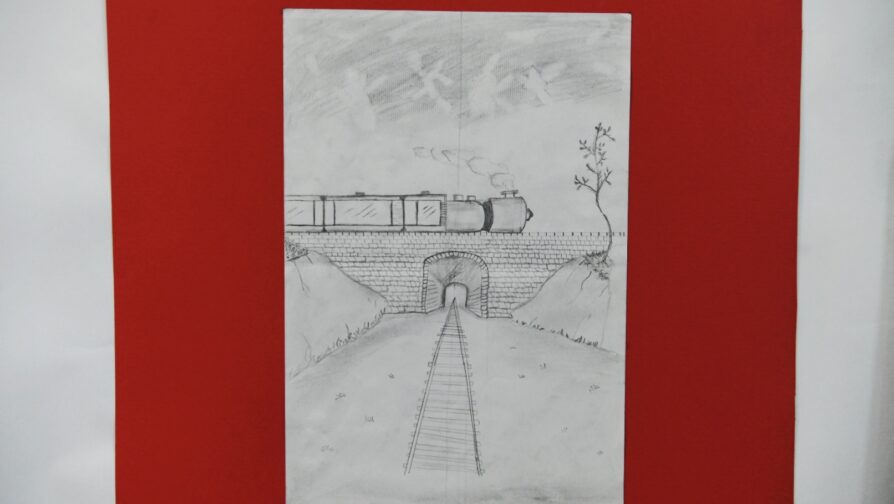
Awarding the prizes at secondary school students competition “Welcome to My Country“ Belgrade, 7 December 2021, @UNHCR/V.Lalić
“I look into the eyes of this tiny refugee boy who does not understand what I am saying. I am afraid they will never feel safety and warmth of a home. But they have seen the horrors beyond my imagination.. I am afraid he will not be able to go to school as I do and sleep peacefully knowing the voice of his mother would wake him up in the morning” reads a paragraph one of the award-winning essays of the competition “Welcome to My Country” for the students of secondary schools in Serbia. “I would like these big eyes to see my country as their salvation and a country of opportunities” the essay goes on. Commenting on how he got the inspiration for the essay, Nikola Pančić says “I tried to put myself in the shoes of refugees, to reflect on what they must be feeling finding themselves in an unknown country, culture, customs”.

Nikola Pančić, winner in the category “the best essay“ Belgrade, 7 December 2021, @UNHCR/V.Lalić
In May 2021, UNHCR Serbia forged a partnership with the 6th Belgrade Grammar School which led to a joint launch of the competition for students of secondary schools Serbia-wide in three categories: best essay, drawing and video. The students were asked to depict their views of refugees, forced displacement and the attitude of communities to the people of UNHCR concern. The end of the competition was timed to coincide with the marking of 70 years of the Refugee Convention. Among the 300 works submitted by the students of 40 secondary schools, three winners in each of the categories were selected by an expert jury, composed of teachers from different regions of Serbia, renowned journalists, EU delegation’s members, and professors of art faculties. The winners were announced at a ceremony held in December.
Bakhta Aryubi, a refugee student from Afghanistan was awarded a special prize for the best refugee student work. She competed with a drawing – a tunnel into the unknown, in an environment never before seen by this child’s eyes. “Life goes on. Sometimes one can control it, and other times not. You never know where it is going to take you,” says Bakhta adding that Serbian language is her favourite subject and that she intends to study to become a “doctor for heart”. She and her five siblings have learned the language in the two years since they joined their father on a family reunification programme.

The awarded drawing of Bakhta Ariyubi, art of refugee students Belgrade, 7 December 2021, @UNHCR/V.Lalić
“With their artwork, the students have sown the seeds of solidarity that will contribute to more inclusive society“, said Francesca Bonelli, UNHCR Representative at the ceremony held in the 6th Belgrade Secondary School. “I was very touched and impressed by the humanity and empathy the students have shown towards refugees. Their attitude and the perception of global refugees’ needs gives us hope for a world with more solidarity toward displacement .“ said Bonelli.
“Inclusive educational practices are a sustainable mechanism valuing and accepting every child. That is why the education of refugees in Serbia is systemically regulated, through inclusive principles, but also through focused instructions and student support plans as well as the intensive Serbian language learning programme“, stated Snežana Vuković, Head of Sector for Human and Minority Rights in Education, Ministry of Education, Science and Technological Development of the Republic of Serbia.
Refugee, asylum-seeking and migrant children have been included in mainstream education since March 2016. More than 1,000 refugee children studied in this way shoulder to shoulder with their Serbian peers. In January 2022, 59 children attend primary and secondary schools Serbia wide. As of September 2021, four UNHCR-supported young refugees have been included in tertiary education thanks also to the European Qualifications Passport for Refugees system and DAFI scholarships.

Winners in the category best video Belgrade, 7 December 2021, @UNHCR/V.Lalić
See also:
https://www.unhcr.org/see/11490-afghan-youth-pursues-his-design-dream-at-college-in-belgrade.html
Share on Facebook Share on Twitter